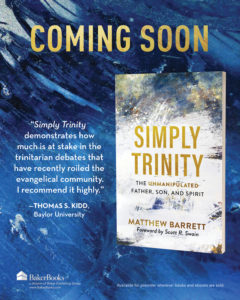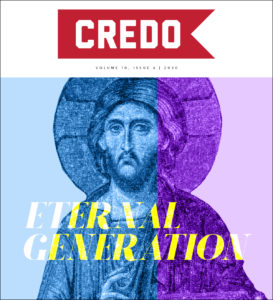In the past century, a renewed interest in the doctrine of the Trinity has emerged. Unfortunately, as this doctrine has moved from the wings to center stage, it has done so stripped of the classical distinctions within trinitarian grammar. Language of persons has given way to distinctions more akin to personalities. Traditional categories of divine processions and missions have been blurred, and new subordinationist theologies have emerged on both the left and the right. Supporting doctrines such as divine simplicity, impassibility, and invisibility have often been cast aside or modified beyond recognition. Steve Holmes says of this 20th century reinvigoration, “We called what we were doing a ‘Trinitarian revival;’ future historians might want to ask us why.” Holmes’s point is well-taken. If the church is to recover a classical trinitarian doctrine, she must concern herself with the classic language that composed trinitarian theology in the first place. One such doctrine which has been tragically neglected is the eternal generation of the Son. Pastors and theologians who seek to guard the good deposit of the faith (2 Tim. 1:14) will greatly benefit from understanding what the eternal generation of the Son is, and what it isn’t. Pastors and theologians who seek to guard the good deposit of the faith (2 Tim 1:14) will greatly benefit from understanding what the eternal generation of the Son is, and what it isn’t. Click To Tweet
The Foundations of Eternal Generation
Trinitarian theology depends on more than the mere confession of God’s three-in-oneness. Classical trinitarian theology utilizes a precise set of terminology in order to describe the full biblical teaching of who God is as Father, Son, and Spirit. This is often referred to as trinitarian grammar. This grammar consists of two parts: vocabulary and syntax. The vocabulary describes the Bible’s teaching regarding who God is (such as “one God in three persons”, etc.). It also provides the syntax (rules for how the doctrines fit together and the logic they follow) needed to understand how to talk about this reality. Trinitarian grammar is analogical, but it is not metaphorical. Through it, we know God truly, even if the analogy is not exhaustive, of God as he reveals himself in Scripture. However, we must not confuse language that is analogical (God is like this, God is described this way, etc.) with language that is metaphorical (such as to say God is Father, Son, and Spirit, but that this isn’t how God knows himself).
One of the key distinctions in trinitarian grammar is that of divine relations. Christians believe that there are real relations in God. Divine relations represent who God is according to how he knows himself: as Father, Son, and Spirit. The relations are (1) Paternity, (2) Sonship, (3) Common Spiration, and (4) Procession. Procession is the language used to describe the manner in which the Son and Spirit are from the Father, while not being created by him. How can it be that the Son is begotten by the Father, but not a created being? This relation[1] is called procession. There are two processions, one of the Son and one of the Spirit. The procession of the Son from the Father is called the eternal generation of the Son.
Defining the Doctrine of Eternal Generation
John Webster’s definition of eternal generation is helpful: “Eternal generation is the personal and eternal act of God the Father whereby he is the origin of the personal subsistence of God the Son, so communicating to the Son the one undivided essence.”[2] Kevin Giles, author of The Eternal Generation of the Son: Maintaining Orthodoxy in Trinitarian Theology, defines it similarly but also adds “begetting and generation in relation to the Son…are the best words available to us human beings.”[3] This is central to the exegetical case for eternal generation. Because of its critical place in trinitarian theology, eternal generation is a foundational doctrine which shapes and governs the development of countless other doctrines. 
Key Claims Considered
Eternal Generation is a biblical doctrine. It is important to recognize that eternal generation is not a piece of speculative theology abstracted apart from the Bible. Much of the argument surrounding whether or not eternal generation is biblical has centered around the meaning of the word monogenes as “only Son” or “only begotten Son” in key texts (Jn. 1:18, 3:16, 1 Jn. 4:9, among others). Kevin Giles points out, however, that the case for eternal generation does not hinge on a single word. This is rarely ever the case, and it was not the case for the church fathers on eternal generation. Even if the proper meaning of the term is “only Son”, all sons are begotten of their fathers. For Arians, the language of Christ’s Sonship (begotten or otherwise) leads to the confession that the Son was created in time from the Father. The doctrine of eternal generation is not the result of prooftexting; instead, it encapsulates the full biblical witness’s own internal reasoning. The canon of Scripture bids theologians to account for God’s own nature as Father, Son, and Spirit. We must ask then: what is the internal reasoning of Scripture for eternal generation? The doctrine of eternal generation is not the result of prooftexting; instead, it encapsulates the full biblical witness’s own internal reasoning. Click To Tweet
Scripture’s description of the divine name (singular) as Father, Son, and Spirit (Mt. 28:19-20) and its repeated use of the triune formula (1 Cor 12:4-6; 2 Cor 13:13) demands an explanation of the unity of persons in one essence. Biblical language of Sonship implies communication of an eternal nature from Father to Son and their unity with one another, while also recognizing the differentiation between the persons. God’s unchanging nature resists any account of emanation out of a monadic God, creation of the Son, or divided will within God (Ex. 3:14; Ps 102:27; Heb 1:12). Eternal generation is grounded in the absolute unity between the Father and the Son, accounting for claims such as “I and the Father are one” (Jn. 10:30).
The logic of the Father sending the Son to be incarnate implies a prior, eternal relation of equality of nature since (a) the Son pre-existed with the Father and therefore can be sent, and (b) the language of Son implies the same eternal nature of the Father. Fathers cannot beget sons with a different nature than their own. Unlike created man, the Father begets a Son eternally who shares his eternal nature. Eternal generation is the internal logic of the Bible’s description of God as “Father, Son, and Spirit”. Eternal generation at the most fundamental level is the recognition of these truths and explanation of the relation between the divine persons of Father and Son; namely, the Father and Son have an essential unity but are self-differentiation by a relation of procession.
Eternal Generation is the active, personal work of begetting by God the Father. While the doctrine is named for the Son, it presumes generation from the Father. The Son is the Son by virtue of his relation to the Father and vice-versa. Insofar as the Son is begotten, he is begotten by the Father who is innascible, unbegotten. The Father, who has life in himself (aseity), grants to the Son to have life in himself (Jn 5:26). The Son is the Logos spoken by the Father; the Father is never without his Word. The Son is the wisdom of God; the Father is never without his wisdom. The Father eternally generates the Son. Generation describes the unbegotten Father begetting the Son, with whom he shares a divine essence.
Eternal Generation is essential to affirm Nicene doctrine. It is a misnomer that Arians merely believed the Son was not God. Arius confessed the divinity of the Son and taught that the Son was a divine being created by the Father as a lesser being than himself. The linchpin of the Arian heresy is a denial of the unity of being between the persons, particularly the Father and the Son. Arius’s slogan was “there was a time when the Son was not.” For the church fathers, particularly Athanasius, who was the most significant defender of Nicene doctrine between Nicaea and Constantinople, the doctrine of eternal generation was critical to rebuff attacks on the preexistence of the Son and his unity of being with the Father. The fathers argued from Proverbs 8 that wisdom was present, working alongside God in creation (v. 30) and was possessed by God in the beginning (v. 22) in reference to the eternal generation of the Son. Likewise, in Psalm 2:7, patristic exegetes argued that the King, who is the begotten Son of God is a witness to the eternal generation of the Son as well—an argument bolstered by the use of the passage in Hebrews 1 to teach of the preexistence and preeminence of the Son. The Nicene Creed codifies the doctrine: “the only Son of God, light from light, true God from true God, begotten, not made; of the same essence as the Father.” No pro-Nicene theologians denied the eternal generation of the Son.
What the Eternal Generation of the Son is not
Generation is a relation of origin (procession) and not a relationship. There is only one divine will. Therefore, there cannot be any relationship between the persons in the way humans share relationships as individuals—not one of authority and submission, Creator and creation, or any other. The divine procession of eternal generation grounds the most fundamental beliefs about God: Father and Son are co-eternal, equal in glory and majesty. God does not change. He does not grow or develop. The persons eternally exist in the relation of generation as the Son eternally proceeds from the Father. Generation is a relation of origin (procession) and not a relationship. There is only one divine will. Therefore, there cannot be any relationship between the persons in the way humans share relationships as individuals—not one of… Click To Tweet
Generation is not creation. What can be known about generation as divine action is beyond human knowledge or revealed truth. Certain realities of the inner life of God are hidden from human understanding. What kind of work is generation within the divine life? It is impossible to say. What can be said is that it is certainly not an act of creation. Generation describes the eternal co-equal relation between the Father and the Son as persons. Begetting implies creation among mankind. Created humans beget other created persons. But God begets what he is in himself: eternal, immutable, divine. The Son shares in the eternal divine life in the Father.
Eternal generation is not a past act of the Father’s will. That the Son is not created by the Father insists we also recognize that generation is not an independent, past act of the will of the Father. There is no time where the Father is that the Son does not generate from the Father. The Father begets the Son is an ontological claim, not a historical one. By nature, the Father generates the Son and by nature the Son is generate from the Father. It is helpful to recognize tense in this distinction: the Son is eternally generate of the Father, not “the Father generated the Son.”
Eternal generation should not be confused with the divine missions. The doctrine of eternal generation makes a claim about what it means that the Son is from the Father regarding his nature. This is distinct from the mission of the Son, which is the Father sending the Son to be incarnate. The eternal relation of the Father and Son is called eternal generation. The sending of the Son is grounded in eternal processions: it is fitting that the Father sends the Son since in the relation of generation he is the source of the Son. But the sending of the Son for incarnation is a unified act of the persons of the Trinity, so much so that Aquinas said we should be comfortable to confess the “…whole Trinity sends the Son…” (1.43.8) Confusing these two (processions and missions) has led some theologians to errantly conclude that the Son submits to the Father eternally, functionally subordinating the Son.
Much more can be said about this critical doctrine, and will be said in the essays to follow. Eternal generation is the bulwark of trinitarian theology. It will not often be mentioned in the average sermon. The phrase itself would likely be met with confused look from people in the pew. It is critical, however, for pastors and theologians as they consider who God is. As a bulwark, it keeps heresy at bay. It protects the essential nature of God, providing terminology to help Christians understand what it means to worship one God in three persons, particularly how the Son is not less than the Father, but is one with him: one in power, glory, majesty, will, and essence. By this Trinitarian grammar, Christians are helped to know God as he knows himself and sing, pray to, and confess him as “God in three persons, blessed Trinity.”
Endnotes
[1] It is important to distinguish here between “relation” and “relationship.” Because God’s nature is simple, the divine relations refer to the taxis, or mode of subsistence, of the persons of the Trinity. God is not reducible to three persons with independent relationships between them.
[2] Webster, John. God Without Measure: Working Papers in Christian Theology. Vol. 1. London: T & T Clark, 2018.
[3] Giles, Kevin. The Eternal Generation of the Son: Maintaining Orthodoxy in Trinitarian Theology. Downers Grove, Ill: IVP Academic, 2012. 24.


